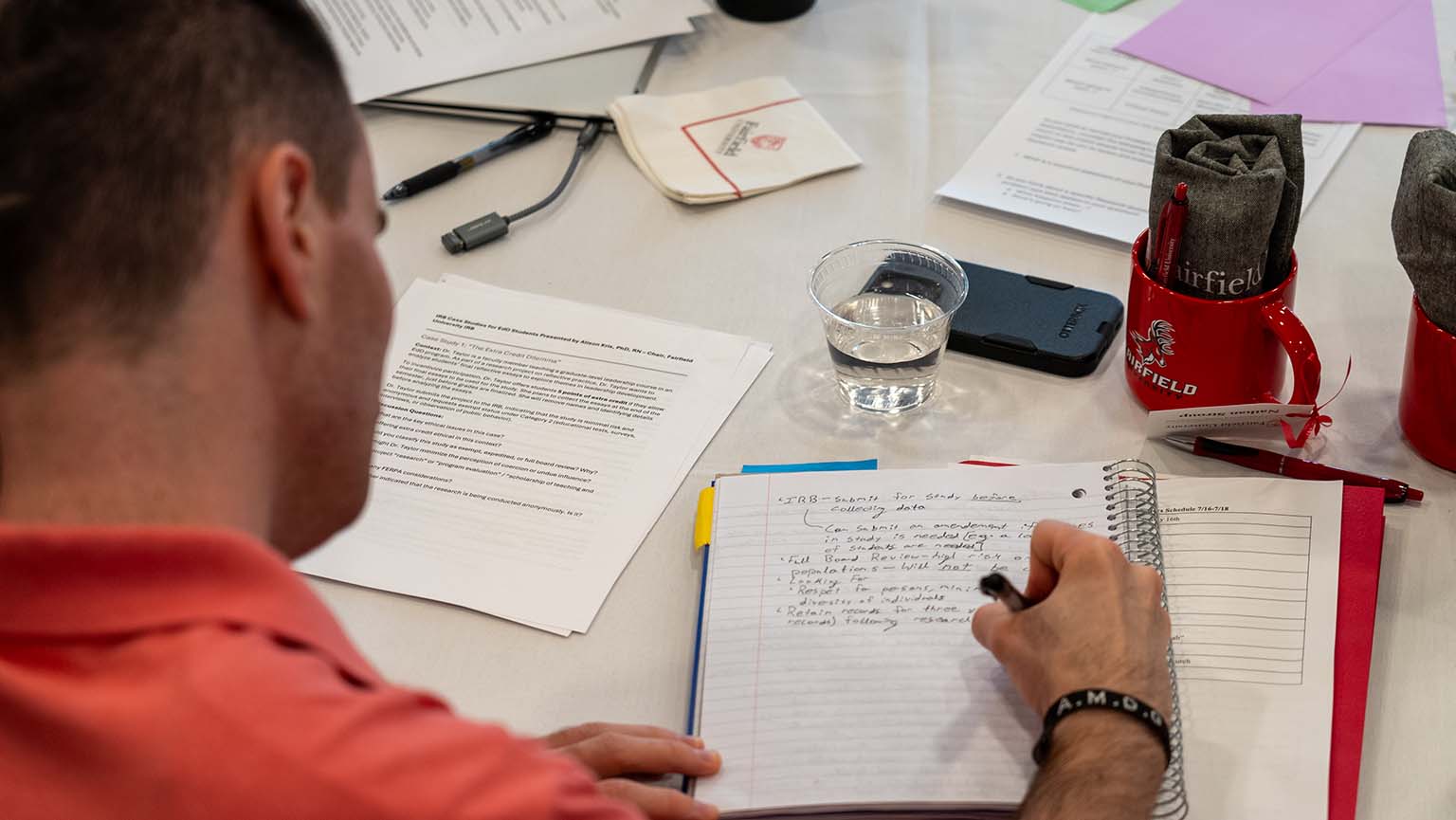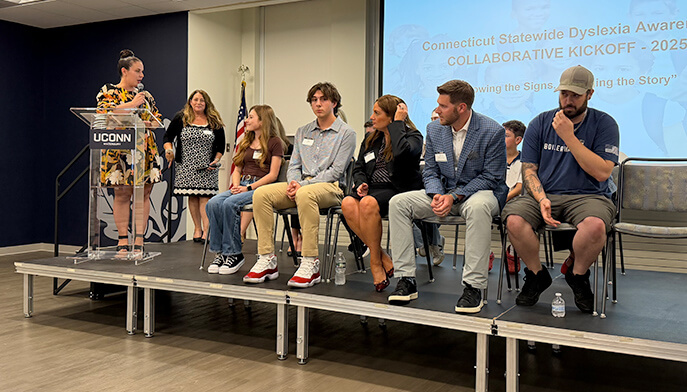One of the most exciting parts of pursuing a Doctor of Education degree is discovering how your professional experience can inspire meaningful, applied research.
Within an EdD program, students don’t just study theory—they design research projects that explore real issues in schools, districts, and organizations.
The EdD dissertation is the culminating experience of this degree program, allowing doctoral candidates to investigate a problem of practice in their own education settings. These projects often focus on leadership, equity, organizational change, or innovation—areas where educators and leaders can make an immediate, measurable impact.
At institutions such as Fairfield University, doctoral students in the Doctor of Education in Educational Leadership program conduct original research informed by their professional goals. Their work demonstrates how education leadership research can strengthen policy, improve student outcomes, and advance equity across the education system. Fairfield’s program includes two tracks—one with a concentration in teacher leadership and another in higher education administration.
What Is EdD Research?
While many education programs at the doctoral level emphasize theory and abstract study, an EdD program is a professional doctorate designed for working practitioners. The research you’ll complete as part of your doctoral study connects scholarship directly to the realities of leading in educational organizations.
An EdD dissertation or capstone is often based on a case study, program evaluation, or applied project. Students use research methods like surveys, interviews, and data analysis to identify solutions and recommend change.
Because the focus is on practice, EdD research tends to examine issues within K–12, higher education, or community-based learning contexts—places where leadership decisions have tangible consequences.
Examples of EdD Research Topics
The variety of EdD research topics is one of the program’s biggest strengths. At Fairfield University, dissertations housed in the DigitalCommons@Fairfield demonstrate the breadth of students’ interests—from classroom instruction to institutional strategy.
Here are just a few examples of education leadership research themes explored by doctoral students:
Leadership and Equity in K–12 Schools
Many students investigate how leadership practices can promote inclusivity and access in schools. For example, one EdD dissertation examined how principals cultivate culturally responsive environments, while another studied mentorship programs that support early-career teachers in urban districts.
These projects reflect the growing emphasis on equity and professional development within the education system.
Social-Emotional Learning and Student Well-Being
Another common area of focus is student wellness. Several doctoral dissertations explore how social-emotional learning (SEL) programs impact behavior, attendance, and academic success. Through original research, doctoral candidates analyze what makes SEL initiatives sustainable and effective across diverse settings.
Leadership in Higher Education
For those working in colleges and universities, EdD research topics often center on institutional change, student engagement, or access. One doctoral study evaluated strategies for improving first-generation student retention, while another assessed how university leadership models affect faculty collaboration.
These research projects help administrators understand how organizational structures and leadership styles influence campus culture.
Teacher Development and Mentorship
A number of EdD dissertations examine how mentorship and coaching affect teacher growth and satisfaction. This kind of education research often uses a case study design, exploring one school or district to identify best practices that can be scaled more broadly.
Such studies directly support leaders responsible for professional learning programs, helping them make informed decisions.
Community Engagement and Partnerships
Some doctoral students focus on strengthening connections between schools and communities. Their EdD research explores how partnerships with local nonprofits, businesses, or families enhance student learning and promote equity.
For example, one project evaluated how school-community partnerships improved career-readiness among high school students in underserved areas.
Technology and Innovation in Education
Technology integration is another emerging theme in EdD dissertations. Topics include how instructional technology supports differentiated learning, how digital equity affects student outcomes, and how online programs are managed at the district level.
These research topics demonstrate how innovation continues to reshape leadership decisions across K–12 and higher education.
How Students Develop Their Research Topics
For many doctoral students, the question is not whether to pursue research, but what kind of research will best connect their experience to impact. Developing an EdD dissertation topic begins with reflection on a “problem of practice”—a recurring issue the student encounters in their work. “That is by design,” says Fairfield Professor Emily Smith. “Their research arises from their local settings. They address a problem of practice that emerges for them from their work.”
From Experience to Inquiry
Most students enter their EdD program with years of professional experience in teaching, administration, or organizational leadership. Faculty advisors help them transform these professional observations into focused research questions.
For example:
- A school principal frustrated by teacher turnover might design a study on retention strategies.
- A university administrator might explore how inclusive hiring practices affect diversity in higher education leadership.
- A curriculum director could analyze how project-based learning improves engagement in STEM courses.
Each student’s topic becomes a natural extension of their professional identity and leadership goals.
Faculty Mentorship and Support
Throughout the doctoral study, faculty mentors guide students through the research process—helping them design methods, collect data, and analyze findings. In the Doctorate of Educational Research program, faculty emphasize the connection between inquiry and action, encouraging students to see research as a tool for change.
Mentors also ensure that doctoral candidates use sound research methods, including both quantitative and qualitative approaches. This structure helps students complete their doctoral dissertations successfully while producing results that are practical, ethical, and relevant.
Collaboration and Peer Learning
Because EdD programs often use a cohort model, students develop their projects alongside peers who are also balancing leadership roles. This collaborative environment offers feedback and accountability, leading to the successful completion of high-quality, practice-oriented studies. Fairfield’s residency component helps students forge relationships with peers and mentors, which enhances collaboration throughout the program.
The Impact of EdD Research
The outcomes of EdD research extend far beyond academic requirements. Graduates use their findings to improve policies, enhance instructional practices, and lead meaningful reform within their institutions.
From Dissertation to Implementation
Many alumni of education leadership programs report that their doctoral dissertation directly informed their work after graduation. Some launched district-wide initiatives based on their findings; others published their research in professional journals or presented at conferences.
Because the Doctor of Education degree focuses on applied scholarship, these studies often lead to immediate improvements in schools and organizations. “We fully expect that students will share their findings with their department members or during a school professional development setting,” says Dr. Smith. “This is action-oriented work. Teachers are the closest people to the students, and if we want to create change, they are the ones who are going to do it.”
Driving Change Across the Education System
Through their education leadership research, doctoral students and graduates contribute to a more equitable and effective education system. Their work supports initiatives that close achievement gaps, improve teacher retention, and enhance student well-being. “Some of my students are passionate about addressing gaps in equity on campus. For example,” says Dr. Smith, “one doctoral student wants to make STEM careers more attainable, and he is well-positioned to do that because of his role in the classroom. The people doing the work need to be the ones who figure out how to make it better.”
The ripple effect of these projects is far-reaching—benefiting not only the organizations that employ these leaders, but also the broader communities they serve.
Turning Practice Into Purpose
The best EdD research topics are born from authentic questions about how to make education better. Whether it’s improving teaching, shaping policy, or building inclusive learning environments, the Doctor of Education degree gives professionals the tools to investigate, innovate, and lead.
By combining original research, reflective inquiry, and real-world application, doctoral students in an EdD program transform challenges into opportunities for change. Their doctoral dissertations don’t just fulfill academic requirements—they make a lasting difference in schools, universities, and communities.
For educators, administrators, and leaders who want to turn experience into impact, education leadership research offers the path forward. Programs like Fairfield’s EdD in Educational Leadership provide the structure, mentorship, and flexibility to help you explore your own ideas and drive progress in education.



